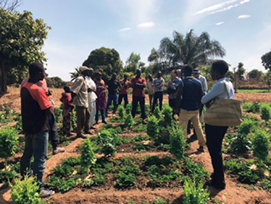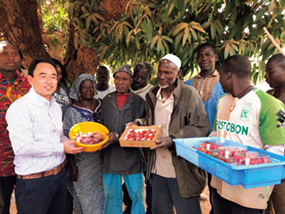Master Techniques from Japan to the World 4
Japanese Agricultural Technology Changes Strawberry Production in Burkina Faso
Initiatives by a Japanese farmer to increase strawberries that can be sold

Local strawberry farmers receiving guidance regarding cultivation methods from Mr. Kato in a strawberry field in Burkina Faso (Photo: Excel Agri)

Mr. Kato giving a lecture on packing methods to strawberry farmers in Burkina Faso (Photo: Excel Agri)
In Burkina Faso, desertification is progressing, and some lands are not suitable for agriculture. Therefore, in order to increase the income of agricultural community residents in the country and promote exports, JICA conducted a development study through the “Project for the Formulation of Master Plan for the Market-Oriented Agriculture” (PAPAOM) from 2013 to 2015, and selected mangos, onions, soy beans, and strawberries as items that can be produced in Burkina Faso. In particular, strawberries have been produced for more than 40 years in the country, and they are as delicious as those produced in strawberry producing countries such as the United States, France, and Australia. Thus, it was found that strawberries are expected to be a potential export article in future. In light of this situation, JICA’s SDGs Business Supporting Survey “Feasibility Survey for Producing High-Quality Strawberry Production Area due to Modernization of Seed Plants and Production Field Equipment” was implemented in 2018.
Mr. KATO Hideaki, President of Excel Agri played a leading role in this feasibility survey. After having worked overseas at a private company, Mr. Kato took over the farm business of his family and produces rice and strawberries in Ichinomiya City, Aichi Prefecture. He went overseas in search of vast agricultural lands starting around 2010, and by making use of his overseas experience, implemented projects to cultivate, distribute, and sell strawberries mainly in Asia. After that, he learned that strawberry cultivation is also conducted in Burkina Faso, and implemented the above-mentioned feasibility survey by JICA. As a result, he is providing support for strawberry cultivation in the neighboring areas of Ouagadougou, the capital of Burkina Faso, by transferring his experience and technology accumulated throughout his years in Japan. Mr. Kato tells us the following about the current situation of local strawberry farmers:
“Farmers in Burkina Faso cultivate strawberries, but do not sell their products by themselves. They entrust the harvest and sale of their strawberries to the women of the community known as ‘market mammies,’ and receive a part of the sales after deducting the commission. Mammies would sell the gathered strawberries at stalls or to restaurants. However, because the harvesting is done manually and with a limited number of people, a large amount of the strawberries were left in the fields and approximately 70% of them were wasted.”
The reason the strawberry farmers in Burkina Faso do not sell their strawberries by themselves, besides the presence of the traditional market mammies, is because they do not have the techniques and tools to conduct organized harvesting, and that they cannot acquire the necessary tools and equipment such as refrigerators to store the harvested strawberries before selling them. In addition, strawberry farmers do not have packing techniques for selling the harvested strawberries, and most of the farmers are not even aware of the existence of markets where their strawberries can be sold. Mr. Kato assures that strawberries produced in Burkina Faso are delicious and capable of being sold as a product due to its quality. According to him, once harvest and sales methods are established, more strawberries would be distributed in the markets, and the income of strawberry farmers would also increase.
Mr. Kato passionately explains the following. “Firstly, by teaching harvesting techniques, I believe it is possible to increase the harvested amount around four times more than now. Also, building a packing factory with refrigerators enables the farmers to sell more strawberries. In Japan, blemished strawberries that are unable to be shipped can be sold after being processed into a puree form. If we build production factories for processing and commercialization of the blemished strawberries in Burkina Faso as well, it will become possible to further reduce wasted strawberries. The local farmers do not do this because they think there is no demand, but I strongly believe that this is not true.”
Actually, strawberries from Burkina Faso are already shipped in small amounts not only within the country, but also to markets in the neighboring countries of Ghana, Côte d’Ivoire, and Senegal. If it becomes possible to increase the amount of salable strawberries by transferring Japanese harvesting techniques and developing facilities such as factories, it is expected that the sales and exportation of the strawberries to neighboring countries will increase and also contribute to the promotion of exports in Burkina Faso.
This initiative is also positively received by the people of Burkina Faso. In November 2018, Mr. Kato had an opportunity to meet with President Kaboré of Burkina Faso during his visit to Japan, and to have the President taste Excel Agri’s strawberries. Moreover, in December of the same year, young officials of the Department of Agricultural Production Development of the Burkina Faso Ministry of Agriculture, Water Resources, Sanitation and Food Security and young leaders from strawberry plantations were invited to Japan, and spent a week visiting and experiencing the strawberry production of Excel Agri. After having experienced strawberry production in Japan, the participants were impressed, and passionately stated, “I want to try packing immediately” and “I definitely want to build a factory.”
Mr. Kato tells us that he too learned a lot through this project. “By cultivating strawberries without tools or fertilizers, etc. in Burkina Faso, I was able to face strawberry cultivation from scratch again. In addition, after witnessing the fact that delicious strawberries can be cultivated even in a severe environment such as that of Burkina Faso, I adopted what I call the ‘Spartan cultivation method,’ which purposely grows strawberries in a severe environment in Japan. We sold the strawberries produced by this method during the Christmas season in 2019, and the strawberries were highly appreciated as being ‘overwhelmingly’ delicious.”
Mr. Kato sees big potential for the future of strawberry production in Burkina Faso, which has also brought positive results to Japanese farming methods.
<< Previous Page
Main Text | Reference Statistics | Stories from the Field | Master Techniques from Japan to the World | ODA Topics
